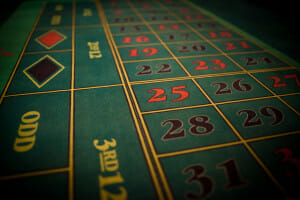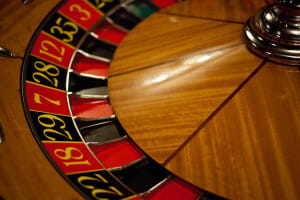Roulette Strategy – A Free Winning System That Will Make You Money, (Until it Doesn’t).

By Steve Beauregard
Are you looking for a roulette strategy that will have you winning at the game in the long run?
Well keep looking, because there isn’t one.
That’s not my opinion, it’s a mathematical fact. The house edge on a typical American casino roulette wheel that has two green slots, (a “0” and “00”) is 5.26%. For every $100 bet, the house will theoretically win $5.26, meaning your $100 will turn into $94.74. Roulette is not beatable in the long run
Fortunately, you won’t be playing it in the long run.
And that, is the basis for every roulette strategy you come across, whether it be found in a book, online in a video, or from a brother-in-law who has discovered a “system” that is guaranteed to win.
You can, and often do, win at roulette, using a system. But this is only in the short run. The good thing for roulette players like you and I (and I am a consistent roulette player), is that nobody really knows how long the long run actually is.
What I mean is that the man or woman who goes into their local casino every day for eight hours a day five days a week, for years to play roulette, like it was a regular job or something, is destined to lose.
But you and I however, are only likely to play roulette a few times each year, on short, and all-too-infrequent visits to Las Vegas. In other words, the short run.
And in the short run, anything can happen.
Which brings us to some of the basic strategies for playing, and possibly winning at roulette, always keeping in mind the only one sure, guaranteed way to win at roulette is to walk away after winning a bet. The “Hit it and quit it,” strategy, as I call it.

Here are some other basic roulette strategies players often use:
Numbers
A favorite of many, players choose one, or several of the 38 numbers on the wheel. That is, the numbers 1 through 36, or the 0 or 00.
Popular systems including betting on birthday numbers, (both the day and month), or anniversaries. For example, recently when playing roulette at the Hard Rock Hotel and Casino in Las Vegas, I put a one-time $5 bet on both the number 5 and 15, since I got married on May 15th. Do you know what happened?
Nothing. However I would have been $175 dollars richer (roulette payouts are 35 to 1 on individual number bets), had I gotten married in December. Or on the 12th.
My point is that number bets are fun, and at most casinos, usually only require a $1 bet, so long as you have at least $5 out there total in bets. (Go here to read my article on How to play roulette in a casino for beginners).
Odd/Even Bet or the 1-18/19-36 Bet
These two betting options are basically each a 50/50 proposition, although the house edge on these bets are still 5.26%.
If you’re the kind who likes to flip coins for money, you’ll like the Odd/Even or First 18/Last 18 bets, or Red/Black bets, which are mentioned later.
With this bet, you win exactly what you put down. You either lose all your bet, or double up quickly.
As the name implies, you can either bet that the ball will land on an even number, or an odd number. Keep in mind, in this case, the 0 and 00 are losers when you put money down on an odd or even bet.
The same thing applies to the 1-18/19-36 bet. You’re counting on the ball landing on either the first 18 numbers, or the last 18 numbers. Betting on these is a near 50/50 proposition, and – like the odd/even and red/black bets, offers a very simple roulette strategy that can have you winning at the game (in the short run).
Combinations
These included betting on multiple numbers that are neighbors, betting on boxes, or even entire columns of numbers.
They are more for the gambler who is going to sit down, cash in for roulette chips and stay and play awhile.
I personally don’t prefer these bets because there are too many combinations of numbers to remember for my simple mind.
My feeble brain can handle “odd/even” to determine whether or not I should be happy after the little white ball has landed. With a boxed bet, or column, there are simply too many combinations of numbers for me to quickly comprehend as to whether or not I won. The fact that I’m usually drinking while playing roulette certainly doesn’t help.
Colors
Color bets are my favorite roulette strategy. This “system” is to make a one-time bet on either the red or black, usually betting $20. The payout on this is 1 to 1. If I win, I take my $40 and leave. This follows my “hit it and quit it” strategy.
If I lose, I reach into my wallet and try to double up, but am stopped by my wife who says we should move on. Which leads us to….
Martingale
The essence of the Martingale roulette system is to double your bet after every loss in hopes of making it up.
While it seems reasonable in the short run, the Martingale betting system is mathematically flawed. That is, over the long run, you will still lose.
Doubling up your bet after a loss seems somewhat reasonable, until your initial $5 bet turns into $10, then $20, then $40, $80, $160, $320, then if you have been OK losing $630 thus far, betting $500, which is obviously less than double the bet of the previous loss, $320, but which is often the table maximum.
With the Martingale roulette betting system on a red/black color bet, for example, you have reached the table maximum after only seven losses in a row. And in roulette, it’s very easy to go seven spins in a row without seeing a red number come up.
Same/Opposite
A variation of the Martingale, this “Same/Opposite” system is just as mathematically disadvantageous as any other system.
The essence of this roulette strategy is that you bet with a streak, or against it, under the theory that a different color is “due.”
For example, the ball landed on red six times in a row, which means it has to land on black now, right?
Or the ball keeps landing on odd numbers, so I’m going to bet the odd numbers. Like the stock market adage, “The trend is your friend.”
The problem with this, and the Martingale, is that each spin of the ball is independent of the prior spin. Just because it came up six reds in a row, doesn’t mean “it’s due” to come up black. Nor is “red” trending. Each spin is separate, and independent. Thinking otherwise is known as the Gambler’s Fallacy.
Bet your streaks, or bet your opposite if you feel a color is “due,” always keeping in mind that the best strategy to win at roulette is to walk away after a win.
Those are the main roulette systems and strategies you’ll either read or hear about. I can’t stress enough that these never work in the long run. Roulette is a fast and fun game that can be profitable, as long as you get out before the long run starts to come into play.
When it comes to roulette strategy, hit it and quit it is the only system for success. (Photos courtesy of Hakan Dahlstrom via Flickr).
